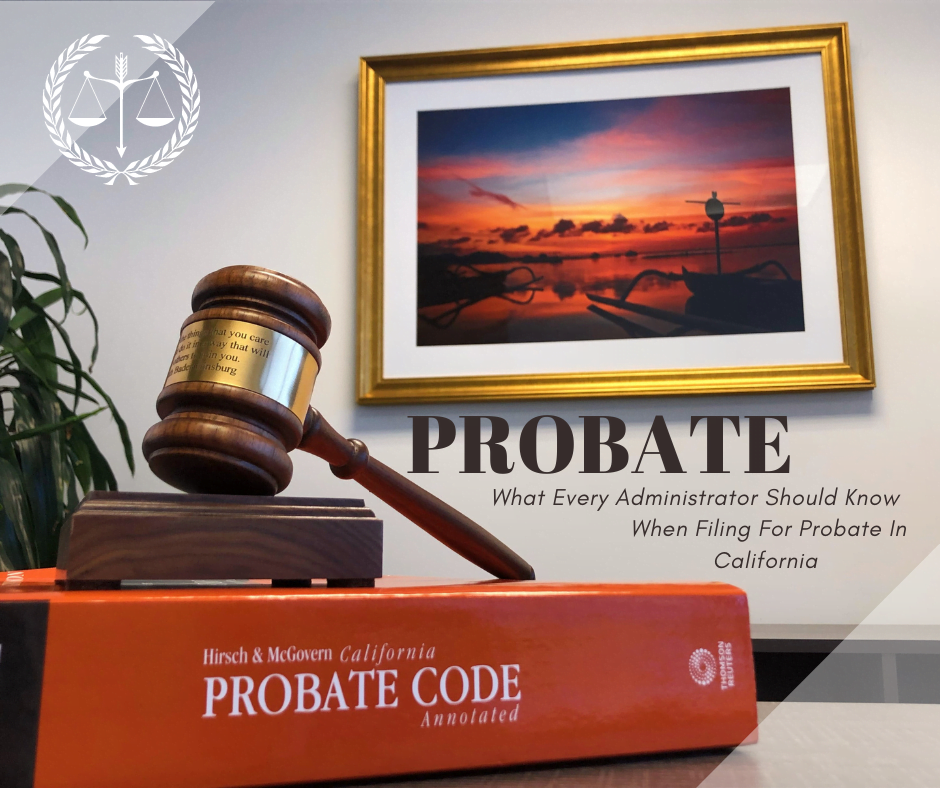He gave me extremely good advice and was very organized in his thoughts and actions. He is very trustworthy.
People like Matt and Elizabeth Talbot give lawyers a good name!!!
Probate in California is the court overseen administration of a person’s estate that occurs when a loved one passes away with only a will, or no will or trust. Going through probate can be an arduous process. Matthew and his team of highly trained probate staff work hand in hand with clients to ensure they are guided through the probate process in a compassionate and effective manner.
Talbot Law Group represents Administrators throughout California, including Contra Costa, Alameda, Santa Clara, Marin, San Francisco, San Mateo County, Orange, and Los Angeles County.
The probate process is designed to collect assets and distribute them pursuant to a Will, or intestate succession when there is no Will. The Probate process can be long and difficult to navigate for anyone who does not have experience with the Probate Courts. Talbot Law Group represents Administrators and Executors, helping them to move through Probate as quickly, efficiently and cost effectively as possible. Our attorneys regularly appear in Court and have represented Executors and Administrators in numerous Probates throughout California.
In California, if the entirety of a person’s estate (bank accounts, houses, cars, etc. without a beneficiary) is less than $184,500, then you don’t need to go through probate. If one’s estate is over $184,500, a Probate will be necessary to transfer assets out of the decedent’s name. Keep in mind that the total value of one’s house, exclusive of mortgage owed, is used to calculate the estate’s value.
If accounts (such as bank or investment) and real property (such as a home) are titled in the name of the loved one (i.e., Joe Smith), then a Probate could be necessary. If they are titled in the name of a Trust (i.e. “Joe Smith, Trustee of the Joe Smith Trust”), then they would not be a part of the probate. Instead, a Trust Administration would be in order. If the accounts and real property titled in the name of the loved one push the Estate’s value over $184,500, and the accounts do not have beneficiary listings, then a Probate would be necessary in California.
If accounts are payable or transferable upon death, then they would not be part of the $184,500 calculation. Those accounts are distributed directly to the listed beneficiary. These accounts are typically set up as “POD’s and TOD’s“. All the beneficiary has to do is provide a Death Certificate and complete bank paperwork. Assets such as life insurance, IRA’s, and 401k’s are the most common types of accounts with a listed beneficiary. However, a number of individuals also name beneficiaries to bank and brokerage accounts.
If an account or piece of property is jointly owned and one owner passes away, then the assets in those accounts become the living owners’ assets. No further paperwork or effort is required by that living owner. Be careful here – because if you intend your assets to be split between several individuals and you have a joint owner on an account, joint ownership always takes precedence over a Will or Trust.
Insurance policies and retirement accounts (pension, 401k, etc.) require a beneficiary. However, sometimes people fail to include a stated beneficiary on their policies. In those instances, the insurance or retirement proceeds are distributed to the Estate. If the proceeds, coupled with other assets, are more than $184,500, then a Probate is necessary.
There might be accounts with varying titles, meaning some are distributed through a Probate, while others are distributed in other ways. An attorney can help you determine which assets are subject to probate.
Call 925-322-1795 or request a Confidential Consultation below:

Talbot Law Group has an experienced team of Probate Attorneys who have handled numerous Probate matters in Contra Costa County, Alameda County, San Francisco County, Santa Clara County, and the surrounding Bay Area. Experience is key when it comes to probates. Each county in California has its own local rules and procedures. Without an experienced probate attorney, one risks considerable delays and potential lawsuits from beneficiaries, in addition to many hours of unnecessary work. As the Attorney for the Personal Representative of an Estate (Administrator/Executor) we perform the following tasks:
Straightforward Probates typically require between 2-4 Court Hearings, while Complex Probates can require more. The attorney for the Executor or Administrator appears at all Court Hearings and works to ensure that each hearing is a success. For example, your attorney will prepare the Petition for Probate with all accompanying documentation, ensure all the Tentative Rulings of the Court are addressed, and the Petition is successfully heard at the Court Hearing.
The Administrator or Executor of an Estate has legal duties and fiduciary obligations they must meet. An experienced probate attorney will ensure that he or she meets all legal obligations, fiduciary responsibilities, and deadlines. This includes responsibilities such as obtaining a Probate Bond, properly noticing beneficiaries and creditors, managing and distributing assets, filing taxes, selling real property, filing paperwork with multiple state agencies and offices, obtaining an EIN, preparing Inventory & Appraisals, preparing an Accounting, and other duties associated with probating the estate. A solid probate attorney also helps mitigate family disagreements over major and minor issues and prevent potential lawsuits from beneficiaries.
The successful probate of an estate involves a number of steps and strict requirements that must be met. Probate Courts are busy and will not hesitate to continue your hearing if all of these requirements are not met. A continued hearing means months are added to the process, delaying access to funds and assets. An experienced Probate Attorney assists family members and others in being appointed as Administrator as quickly as possible so that the Administrator can access estate funds. Thereafter, the attorney will ensure that each requirement along the way is met in the most expedient way possible, so that funds can be distributed to beneficiaries.
The first step in administering a probate is filing the Petition for Probate with the court located in the County where the decedent passed away. If everything is filed correctly, a court hearing will be set in order to appoint a Personal Representative(administrator or executor). However, if there is an urgent need to gain access to a person’s assets, a Special Administration can be set up. A Special Administration in California is granted by the Court on an emergency basis and normally can be set up within a week.
Once a personal representative has been appointed, they can begin the duties of a Personal Representative, Administrator, or Executor in California. Responsibilities include marshaling assets, paying debts and taxes, and distributing assets. Each of these three tasks is complex and has certain legal and fiduciary duties associated with it. Examples include properly noticing heirs, creditors, & the IRS; filing an inventory and appraisal with the court; obtaining an EIN; Taking inventory for assets and having them appraised; Filing the Inventory & Appraisal with the Court; locating and paying creditors, among other duties. Once these obligations have been completed, the personal representative can file a final accounting and petition for distribution with the court. The court will set a hearing date to decide on the finalization of the estate.

Almost every estate will have at least some creditor claims. Some probate estates, however, will have a large amount of creditor claims. A probate attorney can be helpful in organizing, paying, and filing these claims with the court, negotiate down creditor claims, and assist with creditor claims from foreign countries.
When a probate involves one or more more piece of real property (a home, land, or building) that need to be sold, the probate process can begin to get more complicated. For probate sales, you need both an attorney and a realtor who have experience with property held in the name of an estate. Our team is experienced with both home and commercial real property sales, and can work hand in hand with the realtor to ensure the properties are handled appropriately.
Our team has helped save properties that need to be probated from foreclosure on multiple occasions. Even when foreclosure is imminent, beginning the probate process with an experienced and knowledgeable probate attorney can greatly increase chances of preserving the home for beneficiaries.
When a California resident passes away with property in another state (or country), a separate probate may be necessary for those out of state assets. Talbot Law Group has assisted numerous administrators dealing with out of state assets.
Many California residents own assets in other countries, or have beneficiaries who reside abroad. Our firm has handled estates that involve assets and beneficiaries from Japan, Hong Kong, China, Greece, Chile, Ireland, and Spain, just to name a few.
We frequently work with Administrators of California estates that have one or more estate properties with tenants living in them. In some cases, it is necessary to evict the tenants. If eviction is required, we work with Administrators to retain an eviction specialist who can make the process as smooth as possible.
Under the California Probate code, separate property and community property between spouses are distributed pursuant to different terms. In short, a surviving spouse is entitled to inherit more community property than separate property. When someone leaves behind a spouse and also assets that are not in the spouse’s name, those assets may be distributed to other family members through a probate. Always consult an attorney when a spouse leaves behind significant assets that appear to warrant a probate – in fact, a spousal property petition may be the better way to go.
Under certain circumstances, a predeceased spouse’s family members will be entitled to a share of the decedent’s estate. For example: We represented an Administrator who was probating her uncle’s estate in San Francisco. The uncle owned a property. The uncle’s wife had passed away about a year prior to him. They had no children. The property’s titling, the timing of death, and the lack of children meant that the predeceased wife’s father was entitled to a portion of the property once it was sold.
Top San Francisco Bay Area Trust and Probate Law Firm.
Call : (925) 322-1795
consults@talbotlawpc.com Mon – Fri 8:30 – 5:30
Estate Planning and Probate Firm Talbot Law Group assists clients with their estate plans across California, including Contra Costa County, Alameda County, San Francisco County, Napa County, Marin County, Sonoma County, Santa Clara County, San Mateo County, and Los Angeles County.
Call 925-322-1795 or request a Confidential Consultation below:
